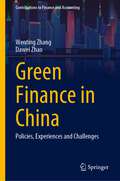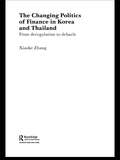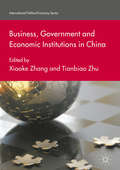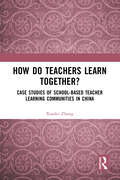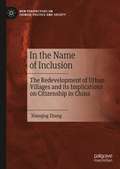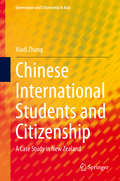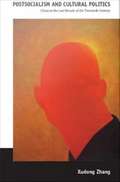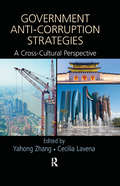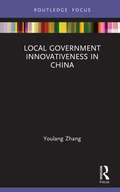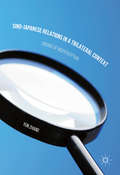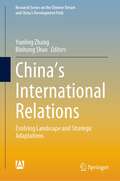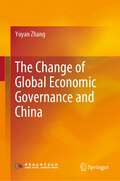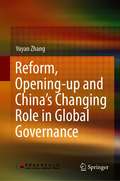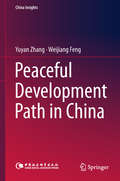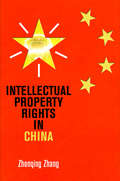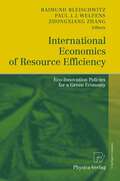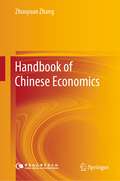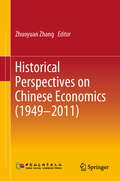- Table View
- List View
Green Finance in China: Policies, Experiences and Challenges (Contributions to Finance and Accounting)
by Wenting Zhang Dawei ZhaoThis book aims to provide first-hand information for readers concerned with green finance and sustainable development by summarizing the unique features, policies and practical innovations of green finance development in China and hoping to provide China's experience in the development of green finance for more regions. The global economy is currently facing historic opportunities that brings by a new round of technology, energy and industrial revolution. The new growth path of "green and low-carbon" development has become the main direction of the transformation of global economic development. What's China's green finance strategy? How does China deliver on the goal? This book builds an overview of China's green finance and sheds light on sustainable development topics from finance perspective.
The Changing Politics of Finance in Korea and Thailand: From Deregulation to Debacle (RIPE Series in Global Political Economy #No.8)
by Xiaoke ZhangThis is the first systematic attempt to explore the causal relationship between financial market reform and financial crisis in an interdisciplinary and comparative perspective. It examines the political underpinnings of financial policy-change and provides an in-depth analysis of market liberalisation processes and their impact on the economic turmoil of 1997-98 in Korea and Thailand. The common crisis stemmed from divergent reform patterns and originated from dissimilar institutional deficiencies and political constraints.The book will be essential reading for both policy-makers and academics concerned with national governance in an era of globalisation.
Business, Government and Economic Institutions in China (International Political Economy Series)
by Xiaoke Zhang Tianbiao ZhuThis book brings together conceptual and empirical analyses of the causes and consequences of changing business-government relations in China since the 1990s, against the backdrop of the country's increased integration with the global political economy. More specifically, it provides an interdisciplinary account of how the dominant patterns of interactions between state actors, firms and business organizations have changed across regions and industries, and how the changing varieties of these patterns have interacted with the evolution of key market institutions in China. The contributors to this edited volume posit that business-government relations comprise a key linchpin that defines the Chinese political economy and calibrates the character of its constitutive institutional arrangements.
How Do Teachers Learn Together?: Case Studies of School-based Teacher Learning Communities in China
by Xiaolei ZhangBased on case studies of Chinese teachers in Shanghai and their workplace learning within the context of reform, this book examines how Chinese teachers learn together when they engage in school-based learning activities. Since the New Curriculum Reform in China in 2001, school-based teaching research groups (TRGs) (Jiaoyanzu) have played an important role in changing teacher learning approaches. Informed by organizational learning frameworks and organizational knowledge theory, the author examines the processes and effects of teacher learning in school-based settings, particularly the role of school leadership in the learning and change of in-service teachers. Implications of sustainably optimizing the school-based teacher learning communities for school improvement are also discussed. The book will be helpful and valuable for policymakers, school leaders, researchers, students, teachers, and other educational practitioners in understanding the distinctive features of school-based teachers’ learning in China.
China's Information and Communications Technology Revolution: Social changes and state responses (China Policy Series)
by Xiaoling Zhang Yongnian ZhengIn recent years, China has experienced a revolution in information and communications technology (ICT), in 2003 surpassing the USA as the world’s largest telephone market, and as of February 2008, the number of Chinese Internet users has become the largest in the world. At the same time, China has overtaken the USA as the world’s biggest supplier of information technology goods. However, this transformation has occurred against the backdrop of a resolutely authoritarian political system and strict censorship by the Party-state. This book examines China’s ICT revolution, exploring the social, cultural and political implications of China’s transition to a more information-rich and communication-intensive society. The pace of the development of ICT in China has precipitated much speculation about political change and democratisation. This book explores the reality of ICT in China, showing clearly that whilst China remains a one-party state, with an ever-present and sophisticated regime of censorship, substantial social and political changes have taken place. It considers the ICT revolution in all its aspects, outlining the dominant trends, the impact on other countries of China as an ICT exporter, strategies of government censorship and use of ICT for propaganda, the implications of censorship for Chinese governance, the political implications of internet culture and blogging, and the role of domestic and foreign NGOs. Overall, this book is a vital resource for anyone seeking to understand a rapidly transforming China, both today and in the years to come.
In the Name of Inclusion: The Redevelopment of Urban Villages and its Implications on Citizenship in China (New Perspectives on Chinese Politics and Society)
by Xiaoqing ZhangThis book follows the citizenship-based approach and interrogates the policies on urban village redevelopment from a perspective of social exclusion and inclusion. It focuses on two questions: how policy makers and urban villagers understand social inclusion differently, and what makes a difference in enhancing social inclusion. Firstly, an examination of citizenship conceptions, as reflected in the Chinese traditional discourses, provides the basis for questioning the political rhetoric of social inclusion in China. Secondly, a comparison between policy makers’ and villages’ interpretations on urban citizenship helps explore the different understandings of citizenship between them. Finally, by studying six redeveloped urban villages in the city of Xi’an, the book identifies what villagers strive for, and discusses how their strivings make a difference in achieving social inclusion during urban village redevelopment.
The Global in the Local: A Century of War, Commerce, and Technology in China
by Xin ZhangThe story of globalization in the nineteenth and early twentieth centuries as experienced by ordinary people in the Chinese river town of Zhenjiang.Fear swept Zhenjiang as British soldiers gathered outside the city walls in the summer of 1842. Already suspicious of foreigners, locals had also heard of the suffering the British inflicted two months earlier, in Zhapu. A wave of suicides and mercy killings ensued: rather than leave their families to the invaders, hundreds of women killed themselves and their children or died at the hands of male family members. British observers decried an “Asian culture” of ritual suicide. In reality, the event was sui generis—a tragic result of colliding local and global forces in nineteenth-century China.Xin Zhang’s groundbreaking history examines the intense negotiations between local societies and global changes that created modern China. In the nineteenth and early twentieth centuries, world-historic political, economic, and technological developments transformed the textures of everyday life in places like Zhenjiang, a midsize river town in China’s prosperous Lower Yangzi region. Drawing on rare primary sources, including handwritten diaries and other personal writings, Zhang offers a ground-level view of globalization in the city. We see civilians coping with the traumatic international encounters of the Opium War; Zhenjiang brokers bankrolling Shanghai’s ascendance as a cosmopolitan commercial hub; and merchants shipping goods to market, for the first time, on steamships.Far from passive recipients, the Chinese leveraged, resisted, and made change for themselves. Indeed, The Global in the Local argues that globalization is inevitably refracted through local particularities.
Chinese International Students and Citizenship: A Case Study in New Zealand (Governance and Citizenship in Asia)
by Xiudi ZhangThis book investigates how Chinese international students reconfigure their sense of themselves as citizens when they reflect on what Chinese citizenship means in the context of New Zealand. Adopting a case study approach, it develops a theory relating to the thoughts of Chinese international students; the theory is based on the communities, schools, family and state relationships of both their past and their contemporary daily experiences. It finds that the struggles of Chinese young people lie in between being individuals and submitting to the general will of the family, state and guanxi (a Chinese concept of interpersonal relationships). The book argues that the Western literature on citizenship is not sufficient in helping us understand how it is viewed in the Chinese contexts.It offers readers a picture of what citizenship means for Chinese young people and the role of citizenship education in Modern Chinese society, and demonstrates that the Chinese young people studied re-educated themselves on citizenship in a way that is unstable and emotional. This book makes important contributions to the literature on Chinese students who are studying abroad by going beyond the well-researched topics of academic and social experience to explore deeper understandings of each individual student’s relationship to family and the state in China and how the study abroad experience has developed new understandings of individual’s relationships to China, and new possibilities for contributing to Chinese society on return.
Postsocialism and Cultural Politics: China in the Last Decade of the Twentieth Century
by Xudong ZhangIn Postsocialism and Cultural Politics, Xudong Zhang offers a critical analysis of China's "long 1990s," the tumultuous years between the 1989 Tiananmen Square crackdown and China's entry into the World Trade Organization in 2001. The 1990s were marked by Deng Xiaoping's market-oriented reforms, the Taiwan missile crisis, the Asian financial crisis, and the end of British colonial rule of Hong Kong. Considering developments including the state's cultivation of a market economy, the aggressive neoliberalism that accompanied that effort, the rise of a middle class and a consumer culture, and China's entry into the world economy, Zhang argues that Chinese socialism is not over. Rather it survives as postsocialism, which is articulated through the discourses of postmodernism and nationalism and through the co-existence of multiple modes of production and socio-cultural norms. Highlighting China's uniqueness, as well as the implications of its recent experiences for the wider world, Zhang suggests that Chinese postsocialism illuminates previously obscure aspects of the global shift from modernity to postmodernity. Zhang examines the reactions of intellectuals, authors, and filmmakers to the cultural and political conflicts in China during the 1990s. He offers a nuanced assessment of the changing divisions and allegiances within the intellectual landscape, and he analyzes the postsocialist realism of the era through readings of Mo Yan's fiction and the films of Zhang Yimou. With Postsocialism and Cultural Politics, Zhang applies the same keen insight to China's long 1990s that he brought to bear on the 1980s in Chinese Modernism in the Era of Reforms.
Whither China?: Intellectual Politics in Contemporary China
by Xudong ZhangWhither China? presents an in-depth and wide-angled picture of Chinese intellectual life during the last decade of the millennium, as China struggled to move beyond the shadow of the Tiananmen tragedy. Because many cultural and intellectual paradigms of the previous decade were left in ruins by that event, Chinese intellectuals were forced in the early 1990s to search for new analytical and critical frameworks. Soon, however, they found themselves engulfed by tidal waves of globalization, surrounded by a new social landscape marked by unabashed commodification, and stunned by a drastically reconfigured socialist state infrastructure. The contributors to Whither China? describe how, instead of spearheading the popular-mandated and state-sanctioned project of modernization, intellectuals now find themselves caught amid rapidly changing structures of economic, social, political, and cultural relations that are both global in nature and local in an irreducibly political sense. Individual essays interrogate the space of Chinese intellectual production today, lay out the issues at stake, and cover major debates and discursive interventions from the 1990s. Those who write within the Chinese context are joined by Western observers of contemporary Chinese cultural and intellectual life. Together, these two groups undertake a truly international intellectual struggle not only to interpret but to change the world. Contributors. Rey Chow, Zhiyuan Cui, Michael Dutton, Gan Yang, Harry Harootunian, Peter Hitchcock, Rebecca Karl, Louisa Schein, Wang Hui, Wang Shaoguang, Xudong Zhang
Government Anti-Corruption Strategies: A Cross-Cultural Perspective
by Yahong Zhang Cecilia LavenaThis book is designed to help students, researchers, and practitioners understand public corruption and anti-corruption practices from an international perspective. It describes the problems governments face in dealing with public corruption, outlines strategies that have and have not been implemented by the government, and explains why some countries have achieved great success with handling corruption and why others still struggle to do so. It contains useful knowledge about public corruption and strategic approaches to preventing, reducing, and combating corruption.
Local Housing Market Cycle and Loss Given Default: Evidence from Sub-Prime Residential Mortgages
by Yanan Zhang Lu Ji Fei LiuA report from the International Monetary Fund.
Angela Merkels Persönlichkeitsgrundzüge und deren Auswirkungen auf die deutsche Außenpolitik (Persönlichkeit und weltpolitische Gestaltung)
by Yang ZhangDie Forschungsfrage des vorliegenden Buches bewegt sich im Bereich der personenbezogenen Politikforschung: Die Beziehung zwischen Angela Merkels Persönlichkeitsgrundzügen und der deutschen Außenpolitik steht im Mittelpunkt der Analysen. Der Autor deutet und interpretiert die Auswirkungen auf die deutsche Außenpolitik anhand der Beispiele Euro-, Ukraine- und Flüchtlingskrise sowie die China-Politik. Er erarbeitet vier Kategorien, denen ihre Persönlichkeitsmerkmale zugeordnet werden können. Die Analyse konzentriert sich vornehmlich auf Merkels Reaktionen auf die externen Faktoren und ihre Optionen bei der Entscheidungsfindung. Die Ergebnisse zeigen, dass Angela Merkels Persönlichkeitsmerkmale erhebliche Auswirkungen auf den Verlauf dieser bedeutenden außenpolitischen Ereignisse zeigten.
Crossing the Himalayas: Buddhist Ties, Regional Integration and Great-Power Rivalry (Contributions to International Relations)
by Yi Zhang Ghulam Ali Nian PengThis book aims to analyze two contrasting trends of integration and rivalry among great powers and regional states of Himalaya. It examines the interactions between the great powers and the small states in the Himalayan region, analyzes the multiple effects of the great power rivalry on the regional cooperation, and predicts the possible directions of the future of the geo-politics and geo-economy in the Himalayan region by incorporating the most recent developments. The main content of the book is divided into 11 parts. The Introduction briefly explains the aims and scope of this book. The following chapter focuses on the Buddhist ties between China and the Himalayan states in the past two millennia and its dual influence in the Himalayan region. The rest 9 chapters provide an in-depth analyses of the security dilemma between China and India, Indian perspectives on China-South Asian relations, Chinese perspectives on U.S. and Japan's engagement with South Asia and Indo-Myanmar relations, and Pakistan, Sri Lanka, Bangladesh and Nepal's responses to the regional integration and great power rivalry in the Himalayan region respectively.This is the first study which brings the Himalaya region at the center of geopolitical and geo-economics cooperation and rivalry thus highlighting its significance in Asian politics. It offers a comprehensive analysis of the complicated geo-political and geo-economic competition in the Himalayan region by inviting experts from both South Asia and China to contribute chapters. It also balances the west-centered views on the great power rivalry by introducing cultural perspective and small state perspective. The broad approach adopted in the book with focus on all important countries expands the scope of readership beyond specific academic community. The book will interest academics, policy makers, journalists, general reader and students of Asian politics.
Constructing a Chinese School of International Relations: Ongoing Debates and Sociological Realities (Worlding Beyond the West)
by Yongjin Zhang Teng-Chi ChangThis edited volume offers arguably the first systemic and critical assessment of the debates about and contestations to the construction of a putative Chinese School of IR as sociological realities in the context of China’s rapid rise to a global power status. Contributors to this volume scrutinize a particular approach to worlding beyond the West as a conscious effort to produce alternative knowledge in an increasingly globalized discipline of IR. Collectively, they grapple with the pitfalls and implications of such intellectual creativity drawing upon local traditions and concerns, knowledge claims, and indigenous sources for the global production of knowledge of IR. They also consider critically how such assertions of Chinese voices and articulation of their ambition for theoretical innovation from the disciplinary margins contribute to the emergence of a Global IR as a truly inclusive discipline that recognizes its multiple and diverse foundations. Reflecting the varied perspectives of both the active participants in the Chinese School of IR debates within China and the observers and critics outside China, this work will be of great interest to students and scholars of IR theory, Non-Western IR and Chinese Studies.
Local Government Innovativeness in China (Routledge Focus on Public Governance in Asia)
by Youlang ZhangLocal government innovation has become one of the most important topics on China’s policy agenda in recent decades. This book explains why some local governments are more innovative than others. This book uses a novel theoretical framework and points out that in China’s multi-level government structure, the administrative hierarchy and the span of control could shape local governments’ innovation motivation, innovation capability, and innovation opportunity, thus influencing local government innovativeness. The author systematically analysed the 177 winners and finalists of the biennial Innovations and Excellence in Chinese Local Governance (IECLG) Awards Programme from 2001 to 2015 to provide convincing empirical evidence to support this theory.This book adopts an institutional approach to explaining local government innovativeness in China and may be a useful reference to help us learn more about local government decisions and behaviours.
Sino-Japanese Relations in a Trilateral Context
by Yun ZhangThis book explains the increasingly turbulent Sino-Japanese relations since the 2000s by innovatively investigating the formation mechanism of mutual misperception deeply rooted in China-Japan-U. S. trilateral structural dynamics. The political and security relationship has been increasingly deteriorating against the high interdependency between the world's second and third largest economies. More ironically, both sides have also shown the intent and made efforts to improve bilateral ties. The author systematically conducts a focused comparison of the evolution of the Sino-Japanese mutual perceptions and policies toward one another during the past decade and a half. Empirically, Yun Zhang closely examines five case studies that provide insights to IR students and scholars and policy makers on how misperception and mistrust have formed, replicated, and intensified.
China’s International Relations: Evolving Landscape and Strategic Adaptations (Research Series on the Chinese Dream and China’s Development Path)
by Yunling Zhang Binhong ShaoThis book provides scholars in the English-speaking world with a window to understand China’s perspectives on diplomatic theories and policies. This book is a study of China’s diplomatic theories and Chinese foreign practice analysis. Along with the recent diplomatic strategy adjustments, diplomatic practices, and changes, it discusses China’s international relations with its neighbors, the USA, Japan, India, the Middle East, and SAARC, as well as the “One Road and One Belt” initiative.
The Change of Global Economic Governance and China
by Yuyan ZhangThis book focuses on global economic governance covering the following five areas: the theoretical and historical evolution of global economic governance, international financial governance, international trade and investment governance, global climate change and sustainable development governance, and international macroeconomic policy coordination. On the one hand, this book aims to provide a general analytical framework for studying global economic governance. On the other hand, the study on global economic governance involves understanding its historical development, exploring its emergence and evolution, analyzing what challenges global economic governance faces in the context of a new globalization, looking into its future development trends, and proposing the direction of the reform of global economic governance system on the above basis, and finally providing theoretical references and policy advice for China’s better participation in global economic governance.
Reform, Opening-up and China's Changing Role in Global Governance
by Yuyan ZhangThis book looks back to 40 years ago for the whole history of China’s reform and opening-up and focuses on the role change of China in the relationship with outside world. In the first half part, the author explores China’s economic reform and opening-up policy from theoretical analysis and systematic interpretation. In the second part, the author aims to present how China’s international roles have changed in recent years and the Chinese appeal and purpose of participating in and improving global governance procedure. The author answers the question of why China has obtained miraculous achievements after its reform and opening-up from academic perspective and provides representative cases with profound but not obscure theoretical interpretation. It is a must-read for anyone who is interested in contemporary China’s economy and foreign affairs.
Peaceful Development Path in China (China Insights)
by Yuyan Zhang Weijiang FengThis book clarifies the misconceptions and misinterpretations of the Chinese Path through historical and market logic. The author begins with a historical review of Chinese institutions from their cultural origins to their modern connotations: Chinese regard unity over individualism; Chinese are more cooperative, intrapersonal and defensive than competitive, invasive and expansive. The market economy is another factor that emphasizes the importance of a peaceful environment and stable system of international institutions so as to achieve sustainable development in China. In closing, the author provides an outlook on the role and responsibility of China as a great power towards developed countries, neighbors, new economic groups and developing countries. China’s development means much to the world.
Intellectual Property Rights in China
by Zhenqing ZhangOver the past three decades, China has transformed itself from a stagnant, inward, centrally planned economy into an animated, outward-looking, decentralized market economy. Its rapid growth and trade surpluses have caused uneasiness in Western governments, which perceive this growth to be a result of China's rejection of international protocols that protect intellectual property and its widespread theft and replication of Western technology and products. China's major trading partners, particularly the United States, persistently criticize China for delivering, at best, half-hearted enforcement of intellectual property rights (IPR) norms. Despite these criticisms, Zhenqing Zhang argues that China does respect international intellectual property rights, but only in certain cases. In Intellectual Property Rights in China, Zhang addresses the variation in the effectiveness of China's IPR policy and explains the mechanisms for the uneven compliance with global IPR norms.Covering the areas of patent, copyright, and trademark, Zhang chronicles how Chinese IPR policy has evolved within the legacy of a planned economy and an immature market mechanism. In this environment, compliance with IPR norms is the result of balancing two factors: the need for short-term economic gains that depend on violating others' IPR and the aspirations for long-term sustained growth that requires respecting others' IPR. In case studies grounded in theoretical analysis as well as interviews and fieldwork, Zhang demonstrates how advocates for IPR, typically cutting-edge Chinese companies and foreign IPR holders, can be strong enough to persuade government officials to comply with IPR norms to achieve the country's long-term economic development goals. Conversely, he reveals the ways in which local governments protect IPR infringers because of their own political interests in raising tax revenues and creating jobs.
International Economics of Resource Efficiency: Eco-Innovation Policies for a Green Economy
by Zhongxiang Zhang Paul J.J. Welfens Raimund BleischwitzHuman societies face a threatening future of resource scarcity and environmental damages. This book addresses the challenge of turning these risks into opportunities and policies. It is a collection of high level contributions from experts of sustainable growth and sustainable resource management. Focussing on economics, sustainability, technology and policy, the book highlights system innovation, leapfrogging strategies of emerging economies, possible rebound effects and international market development. It puts natural resources centre stage and will make an important contribution to achieving the goal of a 21st century Green Economy.
Handbook of Chinese Economics
by Zhuoyuan ZhangThis book reviews the development of Chinese economics since the reform and opening-up, associated with the history and experience of China's economic growth. This book makes a systematic study of the direction of reform, the method of reform, the path of reform, the main body of reform and the motive force of reform, accumulates more experiences that can be used for reference for the exploration of new reforms to be opened, and probes into the way of reform in the next period. The topics cover all key concepts and theories relating to the China's economic reform.
Historical Perspectives on Chinese Economics (1949–2011)
by Zhuoyuan ZhangThe book summarizes the 60 year development of economic theories, explaining in detail the features and development of economic theories from 1949 to 1976 and in the reform and opening-up period. The author has made a systematic theoretical analysis on the economic situation from two different stages — before and after China's reform and opening-up, which put forward many unconventional point of view, and it has contributed visionary ideas for the research on China's economy. It provide the readers with a general understanding of the economic trend and development of contemporary China, with many pertinent answer to the practical and concrete problems about China's economy.
